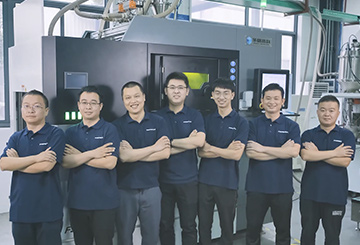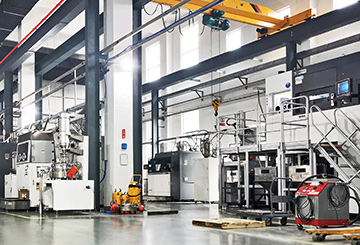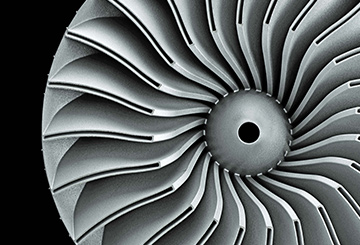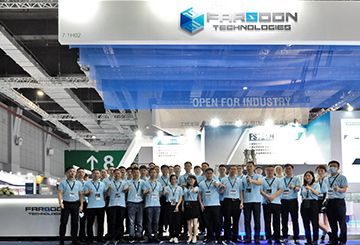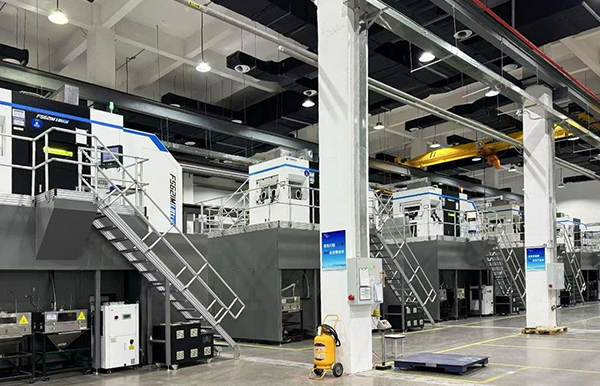When we talk about what’s new in plastic laser powder bed fusion, it’s all about production scalability and material diversity. Farsoon offers expanding plastic powder categories on our “open platform” PBF machines, including PA12, PA6, PA11, PBT, PE, PK, PPS, Thermoset, TPC, TPU, and PP from Farsoon and material partners. More importantly, by combining the best industry know-how with these leading material partners in the industry, Farsoon provides series-production-ready machine-material solutions for customers.
In 2022 Sofos Robotics Co. invested in a Flight HT403P system taking advantage of the powerful fiber lasers for volume production of high-quality end-use parts in a number of industry projects. Now joining us once again President of Sofos Robotics Co, John Huster is here to share their experience operating TPU with Flight Technology. The interview was conducted by Chenlu Fang, Marketing Director from Farsoon Technologies. Let’s jump right to it:
Chenlu: It’s been a whole year since our last interview! We are thrilled to revisit with Sofos. Can you share with us the latest experiences with the Flight system?
John: Certainly, ever since we acquired the Flight machine, it has become our primary printer of choice. Its user-friendly interface and enhanced speed make it our go-to option. The technology has enabled us to customize components for our automation systems and has played a crucial role in the prototyping process. The Flight system has also proven quite beneficial, serving as an additional revenue stream. Overall, the experience has been excellent, and we’re pleased to have integrated it into our operations.
Chenlu: It sounds wonderful. How important is the range of compatible materials for specific industries in your choice of a 3D printing system?
John: Sure, we operate various materials at Sofos. We’ve narrowed down our primary choices to nylon 12 and polyketone material, but we also serve customers who demand specific materials like PA 11, ESD, and TPU from BASF. The Flight machine’s open material and parameters are beneficial since we can run these diverse materials without being tied to a single-source vendor. It provides us the flexibility to explore and optimize materials as needed.
Chenlu: Thanks John. We know some of the projects at Sofos have been using BASF TPU materials. Can you share with us your experience processing this material with Flight Technology?
John: Absolutely, as you mentioned, we’ve experienced that processing TPU material is quite straightforward. It easily breaks out from the powder cake, boasting an excellent surface finish, and we’re particularly pleased with the refresh rate.
Noteworthy projects have included crafting custom guards to prevent equipment damage. These guards serve as protection against potential breakage due to accidental drops, addressing the long lead times from their OEMs. The ability to fine-tune the processing parameter and provide customized solutions, especially for safeguarding equipment, is a key application of TPU.
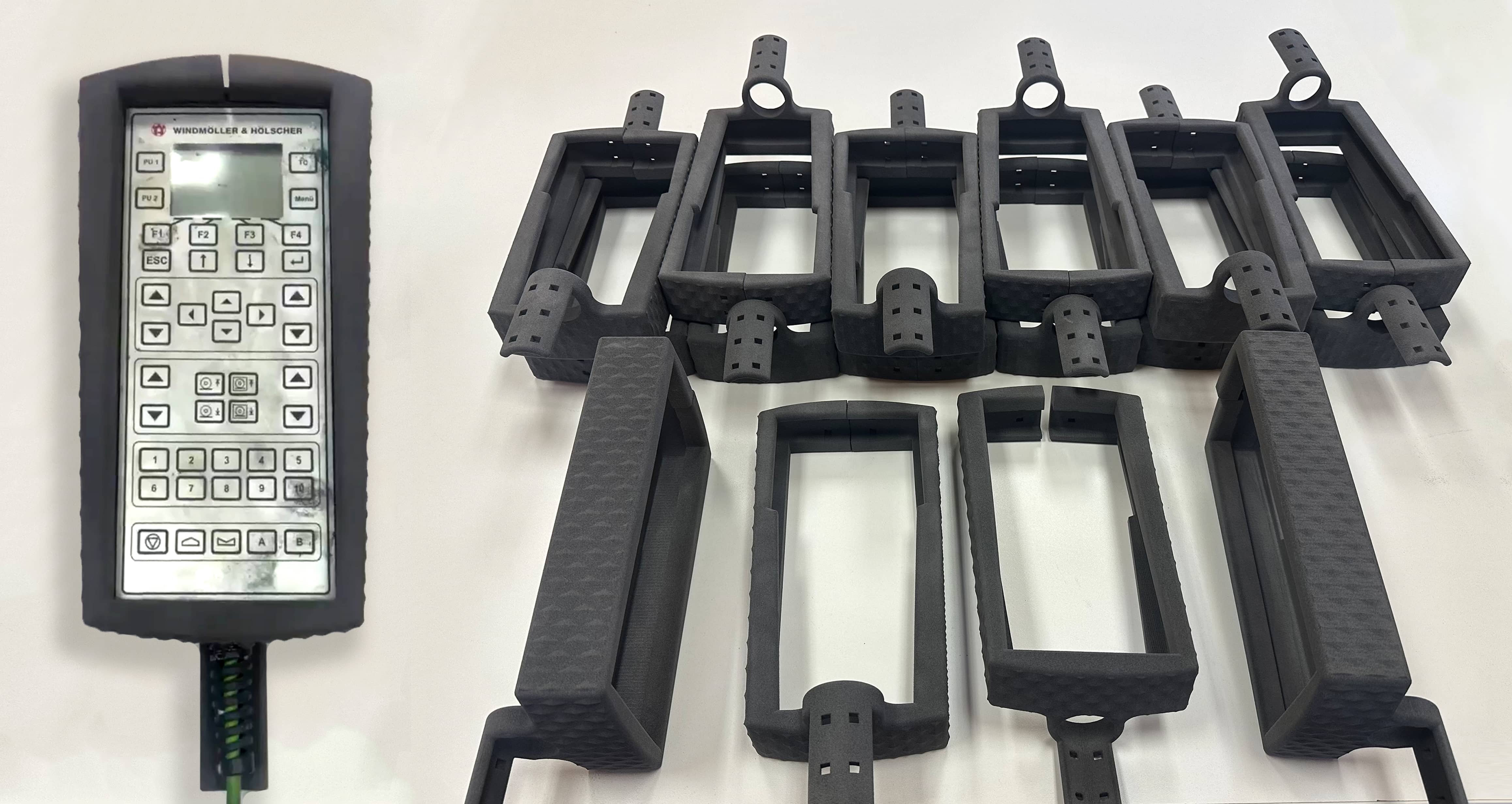
Figure 1: TPU Pendant Guard produced on Flight 403P. Image courtesy: Sofos Robotics
This teach pendant guard was designed for one of our customers to help protect their controllers from damage if they were dropped. There was no solution for this specific controller on the market, and with the controller being an older piece of technology, replacement parts were difficult to find and expensive. To achieve the desired performance, we used TPU and adjusted the wall thickness to help find the optimal durometer. After conducting tests for our customers, we adjusted the thickness to effectively absorb impacts during the drop test.
Customers are very happy with the surface finish and impressed with the quality of the parts.
Chenlu: Can you describe your typical post-process for the TPU parts?
John: Indeed, as I mentioned, it breaks out from the powder cake very easily. Our post-process is a purely physical method. We employed a heating method to raise the part’s temperature, altering its surface finish to resemble that of an injection-molded part. The second option is Vapor smoothing, which involves a chemical aerosol sprayed into a container or cavity, chemically melting only the surface of the part to provide a smoother texture.
Chenlu: Can you share any insights from Sofos, are there specific industries or applications you see that can be utilizing high-volume TPU 3D printing in the future?
John: The TPU material has been extensively used in various projects at Sofos, including medical devices and R&D, such as flexible baffles, consistently delivering impressive results in terms of surface finish and part quality. We had TPU batch production projects of a few hundred in volume. With key features like superb performance, ease of process, and fast production with Farsoon’s Flight Technology, we see promising opportunities in the medical and consumer goods industry with complex geometries.
“BASF Forward AM is proud to partner with Sofos and Farsoon to create TPU parts that are robust, and functional and drive the Industrialization of Additive Manufacturing.” says Jeremy Vos, Business Development for BASF, “it’s great to see how Sofos has used Ultrasint® TPU88A and Farsoon’s Flight Technology to move our whole industry forward! Looking forward to more great stories of AM building value for our customers. ”
“For conventional powder bed fusion process using CO2 laser, TPU can be a tricky material to process. With the amount of smoke emitted and slow sintering speed, it often results in a lower overall package height. In contrast, Farsoon fiber laser sintering (Flight Technology) offers a lightening fast processing speed, and generates almost zero smoke.” says Johnny Zhu, Polymer Product Director for Farsoon, “The Black 88A TPU from BASF has shown many unique properties like ease of processing, surface quality and elasticity. We look forward to the great potential of Fiber Laser Technology will boost a broader range of materials that were previously unsuitable for high-speed, volume production.”
Farsoon has consistently pushed the boundaries of what’s achievable in plastic laser powder bed fusion technology. Farsoon Americas Corp will be exhibiting at AMUG 2024 in Chicago from March 10-14, you are welcome to stop by and take a look at the BASF Ultrasint® 88A TPU parts produced by Flight Technology. We will see you there!
About Sofos:
Sofos Robotics was founded by Mark Walstrom and John Huster in January of 2019. Located in Ham Lake, MN, we provide Automation and Robotic Integration services to help our customers maximize efficiency in their production processes. For more info please visit: sofosrobotics.com
About Farsoon Americas Corp:
OPEN FOR INDUSTRY – Farsoon Technologies, is a global manufacturer and supplier of industrial-level polymer and metal laser sintering systems. Farsoon Americas was founded in the vibrant Austin, Texas area, to better service the North American market. Here at Farsoon Americas, we have built a local team of Additive Manufacturing experts focused on application support, service and sales; with a focus on customer-centric development and technical support infrastructure.

